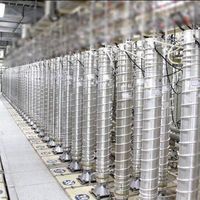US Warns Iran Against Accelerated Nuclear Enrichment
The United States on Thursday threatened to respond to Iran if it further accelerates its uranium enrichment, hours after the UN nuclear watchdog, the IAEA warned that Tehran has increased its capacity.
The US State Department issued a statement warning Iran of its response. “The report issued today by the IAEA makes clear that Iran aims to continue expanding its nuclear program in ways that have no credible peaceful purpose. These planned actions further undermine Iran’s claims to the contrary. If Iran implements these plans, we will respond accordingly.”
The International Atomic Energy Agency issued a report on Thursday saying Iran has responded to last week's UN nuclear watchdog censure resolution by expanding its uranium enrichment capacity at two underground sites. Iran has rapidly installed two more cascades, or clusters, of uranium-enriching centrifuges at its Fordow site and begun work on more while also planning others at its underground plant at Natanz.
"On 9 and 10 June ... Iran informed the Agency that eight cascades each containing 174 IR-6 centrifuges would be installed over the next 3-4 weeks in Unit 1 of FFEP (Fordow Fuel Enrichment Plant)," the confidential International Atomic Energy Agency report sent to member states on Thursday said.
"On 11 June 2024, the Agency verified at FFEP that Iran had completed the installation of IR-6 centrifuges in two cascades in Unit 1. Installation of IR-6 centrifuges in four additional cascades was ongoing," the report said, referring to one of one of Iran's most advanced centrifuge models.
The IAEA Board passed a resolution a week ago calling on Iran to step up cooperation with the agency and reverse its recent decision to bar visits by inspectors.
The resolution was tabled by Britain, France and Germany, which the United States reportedly opposed but later endorsed. Only Russia and China voted against the measure.
The US statement further stated: Iran must cooperate with the IAEA without further delay to fully implement its legally binding safeguards obligations. Until Iran does so, the IAEA Board of Governors will continue to hold Iran to account. We remain in close coordination with our partners and allies and are prepared to continue to increase pressure on Iran should its non-cooperation with the IAEA continue.
Ali Shamkhani, a senior aide to Iran's Supreme Leader, who has been reportedly put in charge of Iran's nuclear negotiations, had warned that Iran would deliver a "serious and effective response" if European nations pursue the resolution.
Iran’s enrichment of uranium to 60% purity in the past two years has no credible civilian use and is viewed as a steppingstone to 90% weapons grade enrichment. The time needed to produce the fissile material for a bomb by further enriching from 60 to 90 percent is just a few weeks, putting Iran in the position of an early nuclear threshold country.
The 2015 nuclear agreement between Iran and world powers had capped enrichment to less than 5% for more than a decade, but former US President Donald Trump withdrew from the agreement known as the JCPOA in 2018 and imposed sanctions on Iran. He argued that that 2015 deal was weak and had a limited restraining life span, demanding a tougher agreement.
Iran’s response during the remaining two years of the Trump term was relatively limited, increasing enrichment to just 5%. However, after President Joe Biden’s election and his declaration to strive for the restoration of the Obama-era agreement, Iran hardened its position, demanding the lifting of US sanctions and accelerating enrichment first to 20% in early 2021, and then 60% later.
Multi-lateral negotiations lasting 18 months to restore the JCPOA failed once Russia invaded Ukraine and Iran began supplying drones to Moscow in mid-2022.








